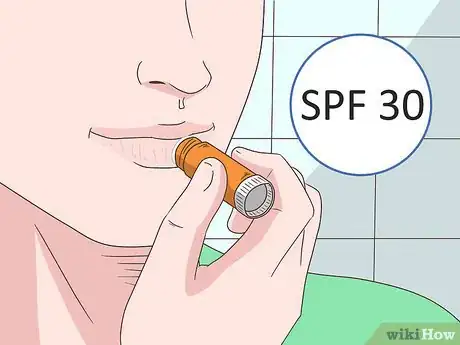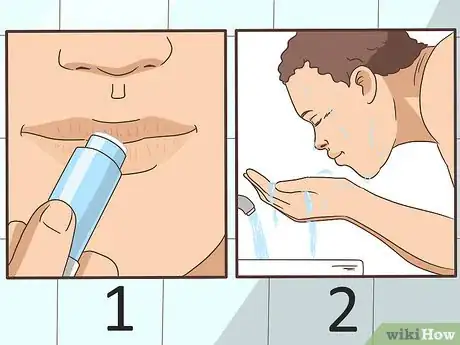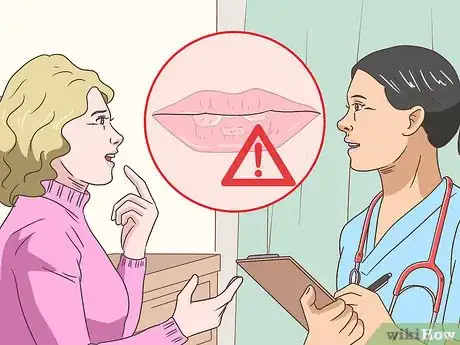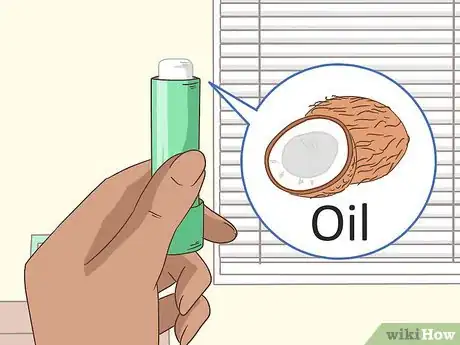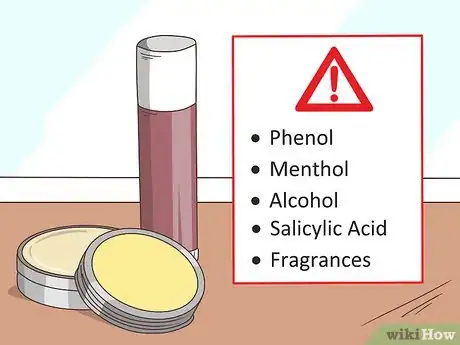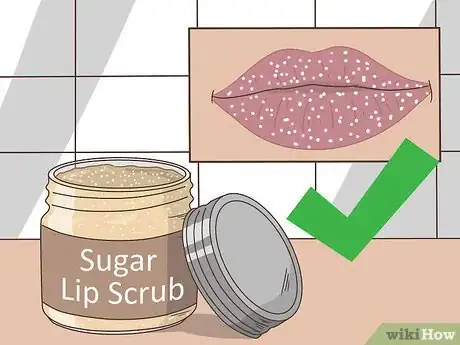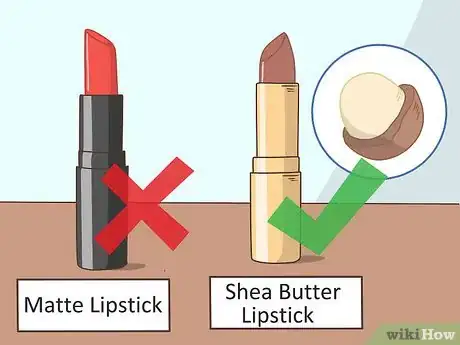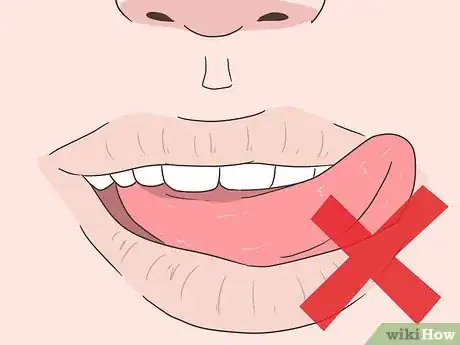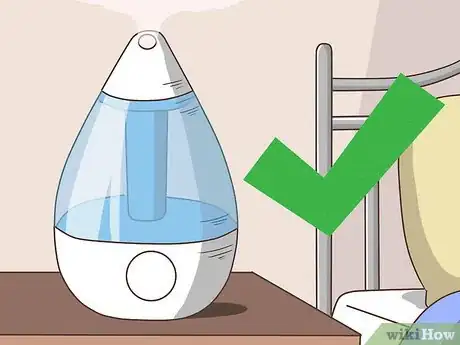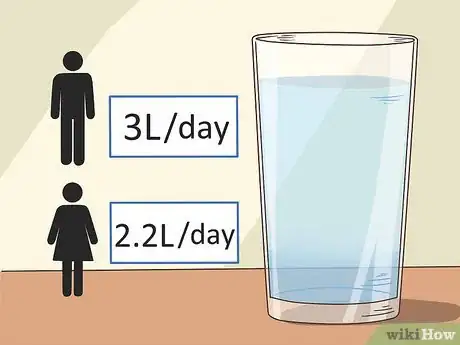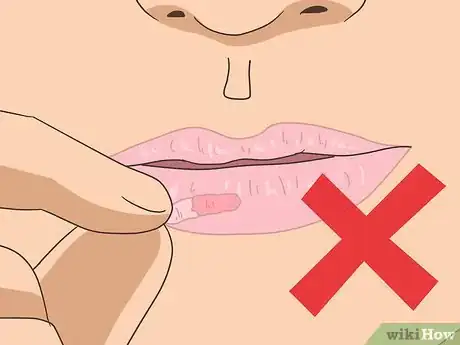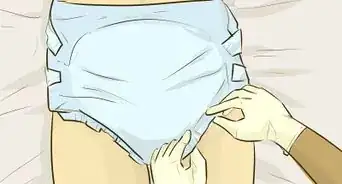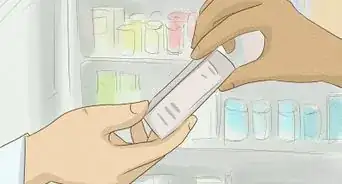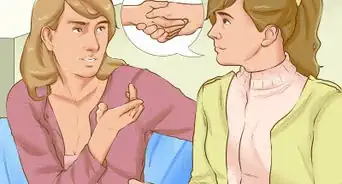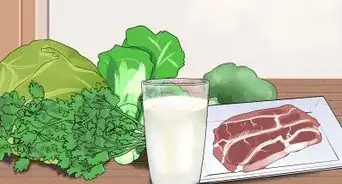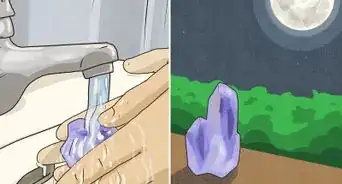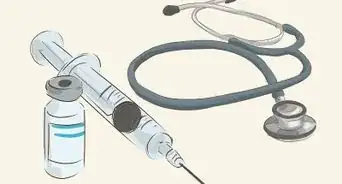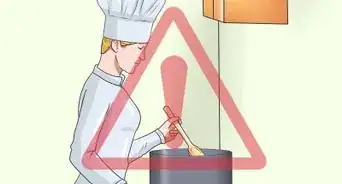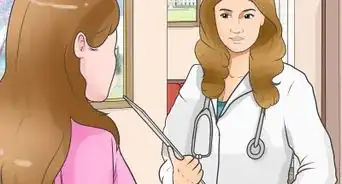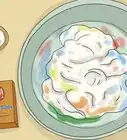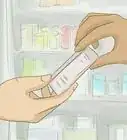This article was medically reviewed by Daniel Wozniczka, MD, MPH. Dr. Wozniczka is an Internal Medicine Physician, who is focused on the intersection of medicine, economics, and policy. He has global healthcare experience in Sub Saharan Africa, Eastern Europe, and Southeast Asia. He serves currently as a Lieutenant Commander in the U.S. Public Health Service and a Medical Officer for the Epidemic Intelligence Service in the CDC. He completed his MD at Jagiellonian University in 2014, and also holds an MBA and Masters in Public Health from the University of Illinois at Chicago.
There are 11 references cited in this article, which can be found at the bottom of the page.
This article has been viewed 58,927 times.
Peeling lips are a problem for many people. You can stop your lips from peeling by taking preventative actions like protecting your lips from the wind and sun. You should also make sure you are using the right types of products on your lips while avoiding those that can cause irritation and peeling. Making easy lifestyle changes like drinking plenty of water and sleeping with a humidifier can also stop your lips from peeling.
Steps
Taking Preventative Measures
-
1Use sunscreen. Exposure to harmful UV rays can cause your lips to crack and peel. You can avoid unnecessary sun exposure by applying sunscreen to your lips. Opt for a moisturizing lip balm with an SPF of 30 or higher.[1]
-
2Protect your lips from the wind. Harsh winds can dry your lips, leading to peeling. You can help protect your lips from the wind by wearing a scarf, especially during the winter. You can also help prevent wind-related damage and peeling by avoiding extreme weather whenever possible.[2]
-
3Apply lip balm before washing your face. Your facial cleanser could be drying out your lips and making them peel. Common cleanser ingredients benzoyl peroxide and salicylic acid can cause your lips to chap, especially if you are exposing your lips to the ingredients regularly. A moisturizing lip balm can protect your lips from these drying ingredients.[3]
-
4Talk to your doctor. Peeling lips can be caused by an allergic reaction to products like toothpaste or lipstick, foods, beverages, or even medication. If you think your peeling lips are the result of an allergic reaction or other underlying medical condition, talk to your doctor.[4]
Using the Right Lip Products
-
1Wear a moisturizing lip balm. Keeping your lips moisturized with a good lip balm will help prevent peeling. Go for a lip balm that contains nourishing ingredients like almond oil, Shea butter, coconut oil, or beeswax. Apply a moisturizing lip balm throughout the day and right before bed.[5]
-
2Avoid lip products with irritating ingredients. Your lip balm could be doing more harm than good for your peeling lips. Ingredients like phenol, menthol, alcohol, salicylic acid, and fragrances can irritate your lips and cause them to peel. For example, cinnamon is a common culprit that can irritate your lips.[6]
-
3Use a sugar-based lip scrub. Scrubs containing irritating ingredients like salt can inflame your peeling lips. Instead of exfoliating your lips with a potentially irritating scrub, try making a sugar-based lip scrub at home to gently slough off peeling skin.[7]
- Combine one teaspoon brown sugar, one teaspoon white sugar, one teaspoon honey, and 1/2 teaspoon olive oil.
- Mix the ingredients together and then massage on your lips for about 20 seconds.
-
4Reconsider matte lipsticks. Matte lipsticks are notorious for drying out your lips. They can cause irritation that leads to chapped or peeling lips. Avoid matte lipsticks and instead opt for lipsticks that contain conditioners like shea butter or macadamia oil.[8]
Making Easy Lifestyle Changes
-
1Don’t lick your lips. Licking your lips can cause them to feel drier. Over time, excessive licking of the lips can cause dermatitis and peeling. Licking your lips can also cause dry, peeling skin in the area surrounding your mouth.[9]
-
2Use a humidifier. A lack of moisture in your indoor environment can lead to chapped or peeling lips. You can replace moisture in the air with a humidifier. Try sleeping with a humidifier on to keep your lips and skin hydrated.[10]
-
3Drink plenty of water. Staying hydrated is key to preventing and healing chapped, peeling lips. Men should aim for about 13 cups or 3 liters of water each day. Women should consume around 9 cups or 2.2 liters of water daily.[11]
-
4Don’t pick at peeling lips. Picking or biting at peeling lips can cause further irritation. Picking can lead to discomfort and pain, as well as make your lips unsightly. Avoid biting or picking your lips. Instead, apply a moisturizing lip balm when you get the urge to pick.[12]
References
- ↑ https://www.aad.org/media/stats/prevention-and-care/sunscreen-faqs
- ↑ https://health.clevelandclinic.org/2015/03/6-tips-to-protect-your-lips-from-the-cold/
- ↑ http://stylecaster.com/beauty/chapped-lips-cure/
- ↑ http://www.dermnetnz.org/topics/allergic-contact-cheilitis/
- ↑ http://www.today.com/style/put-down-lip-balm-doctor-approved-list-chapped-lips-do-t69466
- ↑ http://www.prevention.com/beauty/irritating-lip-balm-ingredients/slide/1
- ↑ http://www.thewonderforest.com/2014/03/diy-homemade-natural-lip-scrub.html
- ↑ http://stylecaster.com/beauty/chapped-lips-cure/
- ↑ http://www.today.com/style/put-down-lip-balm-doctor-approved-list-chapped-lips-do-t69466
About this article
To stop your lips from peeling, avoid licking your lips, which can make them drier and more likely to crack. You can also use moisturizing lip balm with an SPF of 30 or higher to avoid harmful UV rays that can cause your lips to peel. Drinking more water can also help heal and prevent peeling lips, so aim to consume 9 to 13 glasses a day. Additionally, try using a humidifier, especially when you sleep, to keep the air moist, which will keep your lips from cracking. During harsh weather, keep your lips covered with a scarf so the cold or wind doesn't cause any breaking skin. For more tips from our Medical co-author, including how to use lip balm to prevent peeling lips, keep reading!
